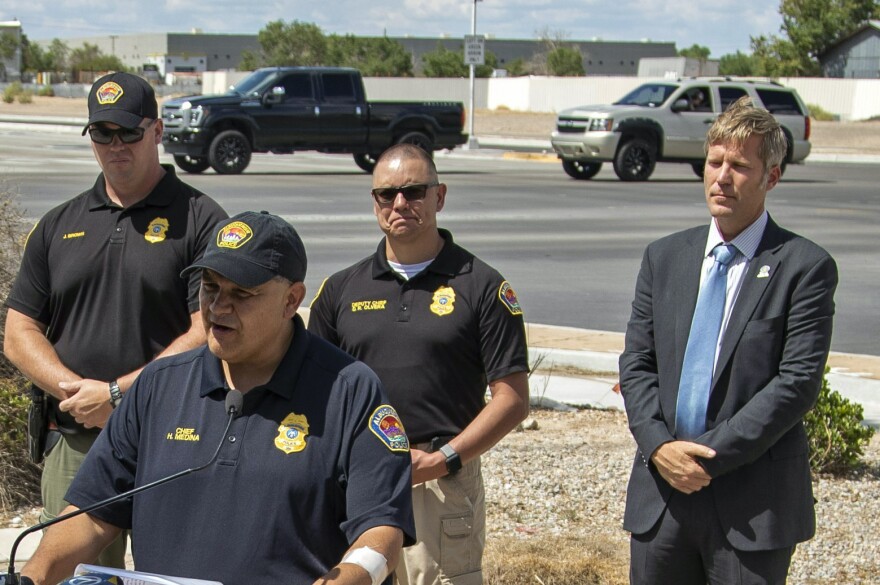After running for re-election on growing the Albuquerque police force, Mayor Tim Keller said he’s given up hope of hitting the longstanding goal of having 1,200 officers. The department is switching gears, according to the mayor, by narrowing officer tasks and relying on civilians and technology to fill in the gaps.
In response to whether increasing the number of APD officers is “a real solution” to the city’s violent crime rates, Mayor Keller told KUNM’s Kaveh Mowahed on Let’s Talk New Mexico, “Well, it’s not a realistic solution, regardless.”
The city has struggled to hit its recruitment goals over the years despite offering hiring bonuses in 2021 and 2022.
Reforming its recruitment strategy was mandated under a 2014 settlement agreement with the Department of Justice resulting from an investigation that found a pattern of unconstitutional use of excessive force in the department. The DOJ last year noted APD has “sustained substantial compliance” with several portions of the consent decree, including recruitment and hiring.
In its November report, the independent monitor charged with overseeing the reforms noted, “APD Recruitment staff continue to provide an impressive array of strategies and concepts for recruiting police officers at a time in history when interest in the profession is down significantly nationwide.” The report notes new uses of social media, digital platforms and in-person strategies resulted in an increase in applicants.
Police Chief Harold Medina said at a press conference in July that the department’s positive marks in complying with the consent decree overall were increasing interest in joining the force.
“We know that a lot of these changes do help us with our recruiting efforts, especially with laterals,” he said. “And we’re hoping we can use this positive momentum to continue to increase the ranks.”
The city said in a statement in October that, while it had met its recruitment goal of hiring 100 new officers, it had lost others to retirement and resignations, leaving its overall numbers stagnant. APD announced a pivot to focusing on retaining existing officers, which included an incentive package for officers eligible to retire, a $1,500 monthly bonus and fully-paid medical benefits.
At a press conference in November, Keller called it “a shift that I believe has saved our department from cascading into a situation of deep shortage.” However, Keller said Thursday that, despite its various efforts, APD has still seen “very little in terms of success” in growing its numbers, which are sitting around 865 sworn officers, according to the National Policing Institute’s Police Data Initiative.
“It’s an old notion that we’re just going to get 1,200 officers and we’re going to be safer,” he told KUNM. “Because we’re never going to get to that number.”
He said safety is instead increased when the limited number of officers the department has are focused on violent crime, like investigating the city’s record number of homicides.
He said the department is increasingly moving toward supplementing officers’ work with technology — like using the ShotSpotter system to detect gunshots using microphones. Though a 2021 study by the MacArthur Justice Center raises concerns about the system’s efficacy, finding it led to thousands of “dead-end” deployments in Chicago.
Keller also said APD is filling certain desk jobs with civilians rather than officers. The Albuquerque Journal reports Shaun Willoughby, president of the Albuquerque Police Officers’ Association, the city’s police union, called the move “desperate” and said it would be unsuccessful. Willoughby said he’d like to see APD continue to focus on growing the number of officers on its force.
The city has also lightened officers’ plates with the establishment of the Albuquerque Community Safety Department, which deploys mental health professionals for 911 calls related to behavioral health and substance use concerns.
“It shouldn’t always be a police officer,” Keller told KUNM of the city’s crisis response. “And this is one area where Albuquerque’s actually leading the way.”
Albuquerque Community Safety has diverted over 13,500 calls from APD since it was established in March, 2021, according to a December report.
KUNM’s Kaveh Mowahed contributed to this report. Learn more on the city and state’s response to curtailing crime on the Feb. 9 episode of Let’s Talk New Mexico.





